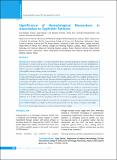Please use this identifier to cite or link to this item:
https://hdl.handle.net/20.500.14356/901| Title: | Significance of Hematological Biomarkers in Association to Syphilitic Patients |
| Authors: | Chand, Arun Bahadur Basnet, Ajaya Shrestha, Lok Bahadur Sen, Bindu Priyadarshinee, Anamika Amatya, Isha Rajbanshi, Bijendra Raj |
| Citation: | ChandA. B., BasnetA., ShresthaL. B., SenB., PriyadarshineeA., AmatyaI., & RajbanshiB. R. (2022). Significance of Hematological Biomarkers in Association to Syphilitic Patients. Journal of Nepal Health Research Council, 20(02), 426-430. https://doi.org/10.33314/jnhrc.v20i02.4074 |
| Issue Date: | 2022 |
| Publisher: | Nepal Health Research Council |
| Keywords: | Hematological biomarkers Sexually transmitted disease Syphilis |
| Series/Report no.: | April-June, 2022;4074 |
| Abstract: | Abstract Background: Venereal syphilis is a sexually transmitted disease, involving pathological activities mediating tissue destruction by extensive tissue necrosis. As such, the goal amongst researchers has been set to the identification of effective laboratory biomarkers that can reflect the broad spectrum of disease and ultimately aid in timely diagnosis and effective treatment of syphilis. This research aimed to study the applications of hematological biomarkers associated with syphilitic patients visiting a tertiary care hospital. Methods: A retrospective cross-sectional study was conducted in the syphilitic patients attending KIST Medical College and Teaching Hospital, Lalitpur, Nepal. A total of 25 syphilitic patients and 41 non-syphilitic participants were included. The rapid plasma reagin test and Treponema pallidum hemagglutination assay were used for the screening and confirmation of syphilis respectively. The hematological investigation was performed using a hematology analyzer. Statistical Package for Social Science version 17.0 was used for data analysis. A P value <0.05 was considered significant. Results: Syphilitic patients showed significantly elevated levels of lymphocytes (39.8±11.5) (p=0.025), monocyte (1.9±0.8) (p=0.002), mean corpuscular volume (MCV) (92.6±12.9) (p=0.005), and mean corpuscular hemoglobin (MCH) (31.9±4.6) (p=0.008) and lowered levels of red blood cell (RBC) (4.2±0.3) (p=0.005) and platelets (237.2±628.6) (p=0.048) as compared to the lymphocytes (32.9±11.9), monocyte (0.6±1.2), MCV (83.9±8.8), MCH (34.3±1.5), RBC (4.6±0.7), and platelets (280.9±113.3) of the non-syphilitic participants. Conclusions: The results showed that the elevated levels of lymphocyte, monocyte, MCV, and MCH and lowered levels of RBC and platelets are highly specific hematological biomarkers for the diagnosis of patients with syphilis. Keywords: Hematological biomarkers; sexually transmitted disease; syphilis |
| Description: | Original Article |
| URI: | http://103.69.126.140:8080/handle/20.500.14356/901 |
| ISSN: | Print ISSN: 1727-5482; Online ISSN: 1999-6217 |
| Appears in Collections: | Vol 20 No 02 Issue 55 April-June, 2022 |
Files in This Item:
| File | Description | Size | Format | |
|---|---|---|---|---|
| 4074-Manuscript-29691-1-10-20221103.pdf | Full Article. | 316.5 kB | Adobe PDF |  View/Open |
Items in DSpace are protected by copyright, with all rights reserved, unless otherwise indicated.
